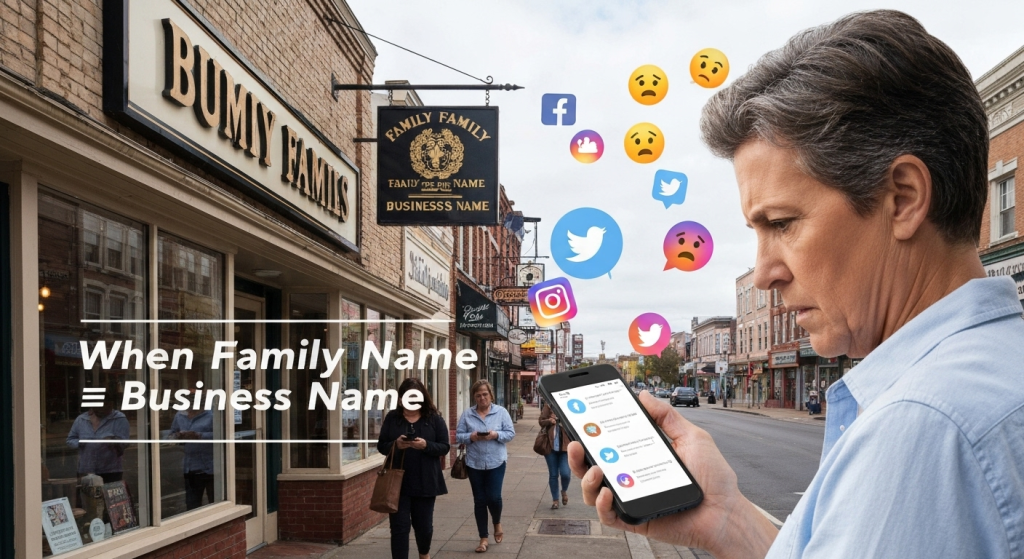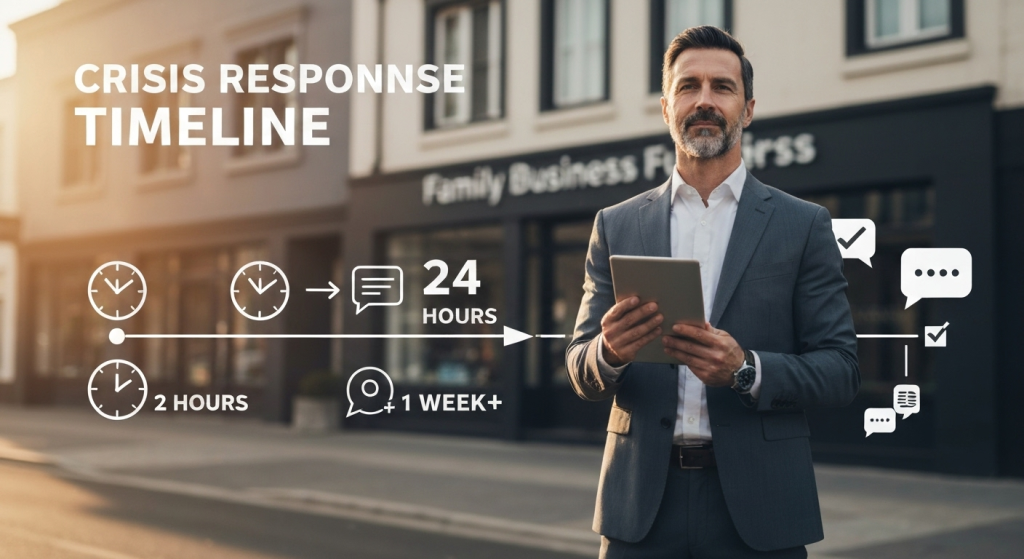Social media crisis management has become a critical skill for family-owned companies. These businesses face unique challenges that differ from large corporations. When a crisis hits, it affects not just the brand but the family name itself.
The social media crisis management market is worth $1.88 billion and growing at 21% annually. This growth shows how serious companies take online reputation threats. For family businesses, the stakes feel even higher.
I’m Richard Boren, and I’ve spent five years helping family-owned companies navigate social media storms. From third-generation bakeries to century-old manufacturing firms, I’ve seen how these businesses can turn potential disasters into opportunities. My experience comes from working directly with over 200 family companies across different industries.
The key difference with family businesses is personal. When something goes wrong online, it’s not just about the company. It’s about the family’s reputation built over generations. This personal connection makes crisis management both more challenging and more important.
Why Family-Owned Companies Face Unique Social Media Risks

Family businesses operate differently than corporations. Their personal nature creates specific vulnerabilities that require special attention.
Personal Stakes Run Higher
When a family business faces criticism, it hits differently. The Johnson family who runs the local restaurant chain doesn’t just worry about stock prices. They worry about their children facing questions at school. They think about Sunday dinners where business problems become family problems.
I worked with a fourth-generation furniture store where negative reviews about customer service became personal attacks on the family’s character. The owner’s daughter, who managed social media, took every comment personally. This emotional investment, while admirable, made crisis response harder.
Limited Resources and Expertise
Most family businesses don’t have dedicated PR teams. The marketing might be handled by the owner’s nephew who’s “good with computers.” Crisis management often falls to whoever is available when the problem hits.
Modern social media crisis management requires cross-functional teams including legal, customer support, marketing, and technology teams. Family businesses rarely have all these specialists on staff.
Deeper Community Connections
Family businesses are often pillars of their communities. A social media crisis can affect relationships built over decades. The local hardware store owner might face their pastor at church after a controversial post goes viral.
These connections are both a strength and a vulnerability. Strong community ties can help during a crisis, but they also mean more people are watching and judging.
| Family Business Advantages | Corporate Advantages |
|---|---|
| Personal relationships with customers | Dedicated PR teams |
| Community trust and loyalty | Crisis management protocols |
| Flexibility in decision-making | Legal and communications experts |
| Authentic brand story | Financial resources for damage control |
Understanding Social Media Crisis Types for Family Businesses
Not all crises are the same. Family businesses need to understand what they’re dealing with to respond effectively.
Customer Service Failures
These are the most common crises for family businesses. A disappointed customer posts about poor service, and it spreads quickly. I’ve seen a single bad restaurant experience turn into a social media nightmare that lasted weeks.
The challenge is that family businesses often know their customers personally. When Mrs. Smith, who’s been coming to your store for 20 years, posts a complaint, it feels like a betrayal.
Employee Misconduct
When a family member or long-term employee does something wrong, it reflects on the entire family. I helped a construction company where the owner’s son made inappropriate comments during a client meeting. The story went viral locally.
Product or Service Issues
Quality problems hit family businesses hard because their reputation is their biggest asset. A recalled product or service failure can destroy decades of trust.
Controversial Statements
Family business owners often have strong opinions. Sometimes these opinions, when shared publicly, create unexpected backlash. Political posts, social issue comments, or even innocent observations can trigger negative responses.
Competitor Attacks
Rival businesses sometimes use social media to attack family companies. These attacks can be subtle or direct. I’ve seen cases where competitors created fake negative reviews or spread rumors about family businesses.
Building Your Crisis Prevention Strategy
Prevention is always better than reaction. Smart family businesses prepare before problems hit.
Set Clear Social Media Guidelines
Every family member and employee needs to understand the rules. Create simple guidelines that cover:
- Who can post on behalf of the business
- What topics to avoid
- How to handle customer complaints online
- When to escalate issues to management
I helped a family restaurant create a one-page social media policy. It prevented three potential crises in the first month. The key was making it simple and actionable.
Monitor Your Online Presence
You can’t manage what you don’t measure. Set up systems to track mentions of your business, family name, and industry keywords.
Free tools like Google Alerts can help small businesses stay informed. For larger family companies, paid monitoring tools provide better coverage and faster alerts.
Essential Monitoring Setup:
- Google Alerts for business name and family name
- Regular checks of review sites (Google, Yelp, Facebook)
- Social media mentions across platforms
- Industry keyword tracking
- Competitor monitoring
Create Response Templates
When a crisis hits, emotions run high. Having pre-written response templates helps family members respond professionally instead of emotionally.
I worked with a family law firm that created templates for different crisis types. When a disgruntled client posted accusations online, they used their template to respond calmly and professionally. This prevented the situation from getting worse.
Template Categories to Prepare:
- Customer service complaints
- Product or service issues
- Employee behavior problems
- Misinformation or rumors
- Negative reviews
The Family Business Crisis Response Framework

When a crisis hits, family businesses need a clear process. Emotions and personal relationships can cloud judgment during stressful times.
Immediate Response (First 2 Hours)
Speed matters in social media crises. Timely intervention is critical because once a crisis gains significant attention, it’s far more challenging to mitigate the damage.
Step 1: Assess the Situation Don’t react immediately. Take 30 minutes to understand what happened. Who posted what? How many people have seen it? Is it spreading?
Step 2: Gather the Facts Get the real story before responding. Talk to employees involved. Check records. Understand exactly what happened.
Step 3: Decide on Response Level Not every negative comment needs a public response. Sometimes a private message works better. Sometimes ignoring it is the right choice.
Crisis Response Decision Matrix:
| Crisis Severity | Public Response | Private Response | Monitor Only |
|---|---|---|---|
| Low (single complaint) | Maybe | Yes | Sometimes |
| Medium (multiple complaints) | Usually | Always | No |
| High (viral negative content) | Always | Always | No |
| Severe (legal/safety issues) | Always (with lawyer) | Always | No |
Short-term Response (2-24 Hours)
This is where family businesses often struggle. The temptation is to over-explain or get defensive. Resist these urges.
Acknowledge Quickly Post a brief acknowledgment that you’re aware of the issue and investigating. This buys time and shows you care.
Gather Your Team Bring together the key family members and employees who need to be involved. Assign specific roles to avoid confusion.
Craft Your Message Your response should be honest, empathetic, and solution-focused. Avoid blame or excuses.
Long-term Recovery (1 Week+)
Recovery takes time, especially for family businesses where relationships matter more than transactions.
Follow Through on Promises If you said you’d investigate, share the results. If you promised changes, implement them publicly.
Rebuild Trust Focus on positive actions that demonstrate your values. This might mean community involvement, improved policies, or transparent business practices.
Communication Strategies That Work for Family Businesses

Family companies have unique advantages in crisis communication. Their personal touch and community connections can turn critics into supporters.
Lead with Authenticity
Corporate responses often sound robotic. Family businesses can be more human. Share genuine emotions and personal stakes in making things right.
When a family restaurant faced criticism about food quality, the owner posted a video of himself in the kitchen explaining new quality controls. His genuine concern and personal involvement turned the narrative around.
Use Your Community Connections
Family businesses often have deep community ties. Loyal customers, local partners, and community leaders can become advocates during a crisis.
I helped a family auto dealership that faced online attacks from a competitor. Local customers who’d bought cars there for decades started sharing positive experiences. The authentic testimonials overpowered the negative attacks.
Show, Don’t Just Tell
Actions speak louder than words on social media. Instead of just promising to fix problems, show the changes you’re making.
Effective Show-Don’t-Tell Strategies:
- Behind-the-scenes videos of improvements
- Photos of new equipment or processes
- Customer testimonials about positive changes
- Community involvement activities
- Family member involvement in solutions
Leverage Family Story
Your family’s history and values are powerful crisis management tools. Remind people why you started the business and what you stand for.
A third-generation bakery faced criticism about changing recipes. Instead of defending the changes, they shared the story of the grandmother who started the business and how they balance tradition with modern needs. This context helped customers understand and accept the changes.
Digital Damage Control Tactics for Small and Medium Family Businesses

Family businesses need practical, cost-effective ways to manage online reputation damage.
SEO for Reputation Management
When people search for your business, what do they find? Negative content often ranks higher than positive content because it gets more engagement.
Create positive content that can outrank negative results:
- Regular blog posts about your business and industry
- Customer success stories and testimonials
- Community involvement updates
- Family history and values content
- Expert advice related to your industry
Review Response Strategy
How you respond to reviews matters more than the reviews themselves. Future customers read your responses to judge your character.
Review Response Framework:
| Review Type | Response Approach | Example Elements |
|---|---|---|
| Positive | Thank and invite return | Personal touch, specific mention |
| Neutral | Thank and offer improvement | Ask for specific feedback |
| Negative (valid) | Apologize and fix | Take responsibility, offer solution |
| Negative (invalid) | Politely correct | Provide facts, stay professional |
| Fake/malicious | Report and respond | Flag for platform, brief factual response |
Social Media Platform Management
Different platforms require different approaches. Family businesses need to understand where their customers spend time and how each platform handles crises.
Platform-Specific Crisis Management:
Facebook:
- Longer, more detailed responses work well
- Community support often rallies here
- Local customers are most active
- Family members can respond personally
Instagram:
- Visual responses are powerful
- Stories allow temporary updates
- Behind-the-scenes content builds trust
- Younger customers more active
Google Reviews:
- Directly affects local search results
- Detailed responses help future customers
- Professional tone is critical
- Response rate matters for rankings
Twitter/X:
- Fast-moving conversations
- Requires quick responses
- Easy for issues to go viral
- Brief, direct responses work best
Technology Tools for Family Business Crisis Management
Family businesses don’t need expensive enterprise tools. Smart, affordable options can provide adequate protection.
Free Monitoring Tools
Start with these free options before investing in paid tools:
- Google Alerts: Set up alerts for your business name, family name, and key products
- Google My Business: Monitor and respond to reviews directly
- Facebook/Instagram Insights: Track engagement and reach changes
- Social media platform notifications: Enable alerts for mentions and messages
Affordable Paid Tools
When your business grows, consider these cost-effective options:
- Hootsuite or Buffer: Schedule posts and monitor mentions
- Brand24: Affordable social listening
- ReviewTrackers: Review monitoring across platforms
- Canva: Create professional crisis response graphics
Crisis Communication Tools
These tools help coordinate family team responses:
- Slack or Microsoft Teams: Internal communication during crises
- Zoom or Google Meet: Quick family meetings to discuss response
- Google Docs: Collaborative response drafting
- Dropbox or Google Drive: Share crisis plans and templates
| Tool Category | Free Options | Paid Options | Best for Family Business |
|---|---|---|---|
| Monitoring | Google Alerts | Brand24, Mention | Google Alerts + one paid tool |
| Scheduling | Native platform tools | Hootsuite, Buffer | Buffer (affordable) |
| Design | Canva free | Canva Pro | Canva free usually sufficient |
| Communication | WhatsApp, email | Slack, Teams | WhatsApp for small teams |
Crisis Response Templates and Scripts
Family businesses need ready-to-use templates that sound authentic, not corporate.
Initial Acknowledgment Template
“We’ve seen the concerns about [specific issue] and want to address them directly. We’re looking into this immediately and will update you with our findings and action plan within [timeframe]. Your trust means everything to our family business.”
Apology Template (When at Fault)
“We made a mistake with [specific issue], and we own that completely. This doesn’t reflect the values our family has built this business on for [years in business]. Here’s what we’re doing to fix it: [specific actions]. We’ll keep you updated on our progress.”
Correction Template (For Misinformation)
“We’ve seen some incorrect information about [specific claim] circulating online. Here are the facts: [clear, simple facts]. We understand this confusion may have caused concern, and we’re happy to answer any questions directly.”
Customer Service Recovery Template
“[Customer name], we clearly didn’t meet the standards you expect from us, and that’s disappointing for our family business. We’d like to make this right. Please contact us directly at [contact info] so we can resolve this properly.”
Case Studies: Family Businesses That Handled Crises Well
Real examples show how family businesses can turn crises into opportunities.
Case Study 1: The Local Restaurant Chain
A family restaurant chain faced criticism when a customer found a hair in their food and posted photos online. The post got 500 shares and dozens of negative comments within hours.
What They Did Right:
- Responded within 2 hours
- Owner personally apologized in video format
- Showed kitchen cleanliness procedures
- Invited the customer back for a free meal
- Implemented visible new hygiene protocols
Result: The transparency and personal response turned critics into supporters. Several customers praised their handling of the situation.
Case Study 2: The Manufacturing Company
A third-generation manufacturing company faced safety concerns when a former employee posted about workplace conditions. The accusations were partly true and partly exaggerated.
What They Did Right:
- Acknowledged legitimate concerns immediately
- Corrected false information with facts
- Shared their safety improvement timeline
- Involved current employees in testimonials
- Brought in third-party safety auditor
Result: The proactive response and commitment to improvement actually enhanced their reputation among potential customers and employees.
Case Study 3: The Retail Store
A family clothing store faced backlash for a social media post that customers found insensitive. The post was meant to be humorous but came across as tone-deaf.
What They Did Wrong Initially:
- Defended the post instead of listening
- Made excuses about intent versus impact
- Took 12 hours to respond
What They Did Right After:
- Deleted the post and apologized sincerely
- Explained what they learned from the mistake
- Changed their content approval process
- Donated to a related charity
Result: After the initial stumble, their honest response and concrete changes rebuilt trust.
Legal and Reputation Considerations
Family businesses must balance legal protection with reputation management. Sometimes legal advice conflicts with good crisis communication.
When to Involve Lawyers
Bring legal counsel into crisis management when:
- Safety issues are involved
- Discrimination claims are made
- Employment law questions arise
- Intellectual property disputes occur
- Regulatory compliance is questioned
Balancing Legal and PR Needs
Lawyers often recommend saying nothing publicly. PR experts want immediate communication. Family businesses need to find the middle ground.
Compromise Strategies:
- Issue holding statements while gathering facts
- Focus on values and commitments rather than specific events
- Use “we’re investigating” language
- Separate business issues from personal attacks
- Document everything for potential legal use
Privacy Protection for Family Members
Family businesses must protect family members who aren’t involved in the business. Create clear boundaries about what’s public and what’s private.
Family Privacy Guidelines:
- Don’t involve children in business disputes
- Keep personal family matters separate
- Designate official business spokespersons
- Train family members on appropriate responses
- Create personal social media guidelines
Building Long-term Resilience
Crisis management isn’t just about handling problems. It’s about building systems that prevent crises and minimize their impact.
Strengthen Customer Relationships
Strong customer relationships are your best crisis insurance. Loyal customers will defend you when problems arise.
Relationship Building Strategies:
- Regular community involvement
- Personal customer service touches
- Transparent business practices
- Consistent quality delivery
- Open communication channels
Invest in Team Training
Your employees are your front line in crisis prevention and management. Train them to spot potential problems and respond appropriately.
Training Focus Areas:
- Customer service excellence
- Social media best practices
- Crisis escalation procedures
- Brand values and messaging
- Professional communication skills
Create Feedback Loops
Regular feedback helps you spot problems before they become crises. Create multiple ways for customers to share concerns privately before going public.
Feedback Systems:
- Regular customer surveys
- Employee suggestion programs
- Community advisory groups
- Social media monitoring
- Direct communication channels
Measuring Crisis Management Success
Family businesses need simple ways to track how well their crisis management works.
Key Metrics to Track
Immediate Response Metrics:
- Response time to initial crisis
- Reach of negative content
- Engagement on crisis posts
- Customer service inquiry volume
- Media coverage tone
Recovery Metrics:
- Customer retention rates
- New customer acquisition
- Online review ratings
- Social media follower growth
- Employee satisfaction scores
Long-term Health Indicators
Reputation Recovery Signs:
- Positive review volume increases
- Customer referrals return to normal levels
- Community support remains strong
- Employee morale stays high
- Business performance recovers
Common Mistakes Family Businesses Make
Learning from others’ mistakes saves time and reputation damage.
Getting Too Personal
Family business owners often take criticism personally. This leads to emotional responses that make situations worse.
Example: A family bakery owner responded to negative reviews by sharing personal financial struggles and family health issues. While this generated sympathy, it also made customers uncomfortable and unprofessional.
Inconsistent Messaging
When multiple family members respond to the same crisis, messages can conflict. This confuses customers and damages credibility.
Solution: Designate one primary spokesperson for each crisis. Other family members should direct inquiries to this person.
Ignoring Small Problems
Family businesses sometimes think personal relationships will solve everything. They ignore online complaints, assuming loyal customers will understand.
Reality Check: Crises can spread quickly on social media and cause problems for brands. Small problems become big problems when ignored.
Over-explaining
Family business owners often want to tell the whole story. They provide too much detail and create more questions than answers.
Better Approach: Keep initial responses brief and focused. Provide details only when specifically asked.
Advanced Crisis Management Techniques
Experienced family businesses can use sophisticated techniques to turn crises into opportunities.
Crisis Hijacking Prevention
Competitors or critics sometimes try to hijack your crisis response. They add fuel to fires or redirect conversations to attack your business.
Prevention Strategies:
- Respond quickly to control the narrative
- Focus conversations on solutions
- Use positive examples and testimonials
- Redirect to private channels when appropriate
- Don’t engage with obvious trolls or competitors
Community Alliance Building
Build relationships with community leaders, loyal customers, and industry peers before you need them. These allies can provide crucial support during crises.
Alliance Building Actions:
- Regular community involvement
- Industry association participation
- Customer advisory groups
- Local media relationships
- Peer business connections
Proactive Reputation Building
Strong reputations survive crises better. Build positive content and relationships continuously, not just during problems.
Reputation Building Content:
- Customer success stories
- Family business history and values
- Community involvement highlights
- Behind-the-scenes business operations
- Industry expertise and advice
Future-Proofing Your Family Business
Social media and crisis management continue evolving. Family businesses need to stay current with trends and technologies.
Emerging Trends to Watch
AI and Automation: AI and social media together contribute to enhancing marketing resilience during crises by enabling real-time engagement and data-driven decision-making. Even small family businesses can benefit from AI-powered monitoring and response tools.
Video Communication: Visual content performs better than text during crises. Family businesses should be comfortable using video for crisis response.
Platform Changes: Social media platforms constantly update their algorithms and features. Stay informed about changes that affect how your content is seen and shared.
Generational Transitions: As younger family members take leadership roles, they bring different communication styles and social media expertise.
Preparing for Unknown Challenges
The next crisis might be unlike anything you’ve faced before. Build flexible systems that can adapt to new situations.
Flexibility Principles:
- Train multiple family members in crisis response
- Create adaptable templates and procedures
- Build diverse community relationships
- Stay current with communication trends
- Learn from every crisis experience
Frequently Asked Questions
Q: How quickly should a family business respond to a social media crisis? A: Within 2 hours for initial acknowledgment, 24 hours for detailed response. Speed shows you care and helps control the narrative before it spreads.
Q: Should family members defend the business on their personal social media accounts? A: Generally no. Personal defenses can make situations worse and blur professional boundaries. Designate official business responses instead.
Q: What’s the biggest mistake family businesses make during social media crises? A: Taking criticism too personally and responding emotionally instead of professionally. This escalates conflicts and damages credibility.
Q: How can small family businesses afford crisis management tools? A: Start with free tools like Google Alerts and platform notifications. Invest in affordable paid tools only as your business grows and needs more sophisticated monitoring.
Conclusion
Social media crisis management for family-owned companies requires balancing personal investment with professional response. The stakes feel higher because your family name is on the line, but this personal connection can also be your greatest strength.
Success comes from preparation, quick response, and authentic communication. Build systems before you need them. Train your team to respond professionally. Most importantly, remember that how you handle a crisis often matters more than the crisis itself.
Family businesses have survived for generations by adapting to challenges. Social media crises are just the latest test of that resilience. With the right approach, these challenges become opportunities to demonstrate your values and strengthen customer relationships.
The key is not avoiding all crises – that’s impossible in today’s connected world. The key is handling them so well that customers trust you even more afterward. Your family’s reputation, built over years or decades, can actually become stronger through well-managed crisis responses.
Start preparing today. Your future self and your family legacy will thank you.


